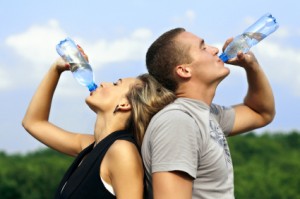 The dog days of summer are fast approaching, and while we can’t control the rising temperatures outside, we can control the heat of our bodies. That means drinking fluids and that, of course, begs the question; how much water should you drink?
The dog days of summer are fast approaching, and while we can’t control the rising temperatures outside, we can control the heat of our bodies. That means drinking fluids and that, of course, begs the question; how much water should you drink?
“You body is about 60% water and every organ needs water, from flushing out toxins to carrying nutrients throughout your body,” says Mark Gregory, Vice-President of Pharmacy and Government Relations for Kerr Drug. “A lack of water leads to dehydration, which can make you tired and lead to a build-up of toxins in the body. It also makes it harder for the body to control its temperature.”
In general, doctors advise drinking eight to nine cups of fluid a day and even more if you’re going to be in the summer heat. It doesn’t need to be just water, as all fluids count towards the total, but when it’s really hot it’s best to stay away from liquids that contain caffeine, alcohol, or large amounts of sugar. Here’s the reasoning: You lose about one-point-five liters (six point three cups) in urine. Breathing, sweating and bowel movements account for another four cups. You’ll take in 20% of the fluids you need from food, which means you’ll need to consume about two liters of fluid (about eight cups) just to break even. That’s why more fluids are needed if you’re going to be out in the sun.
“Here’s a good rule of thumb I tell my patients,” adds Gregory “If you drink enough fluids that you rarely feel thirsty, your body is telling you that you’re on the right track.” Other hot weather tips include:
- Slow Down. Stay in a cool place and reduce strenuous activities.
- Dress cool. Lightweight, light colored clothing.
- Don’t get too much sun. Wear sunscreen (SPF 15 or greater)
“Heat related injuries range from minor issues such as muscle cramps which are caused by a loss of water and salt through perspiration, dizziness, clammy skin and rapid heartbeat; to heat exhaustion which is more severe and includes headaches, nausea and weakness; to heat stroke which is life-threatening,” says Gregory. “The risk of heat illness increases along with temperature and humidity so you must respect the summer heat as well as enjoy it.”

